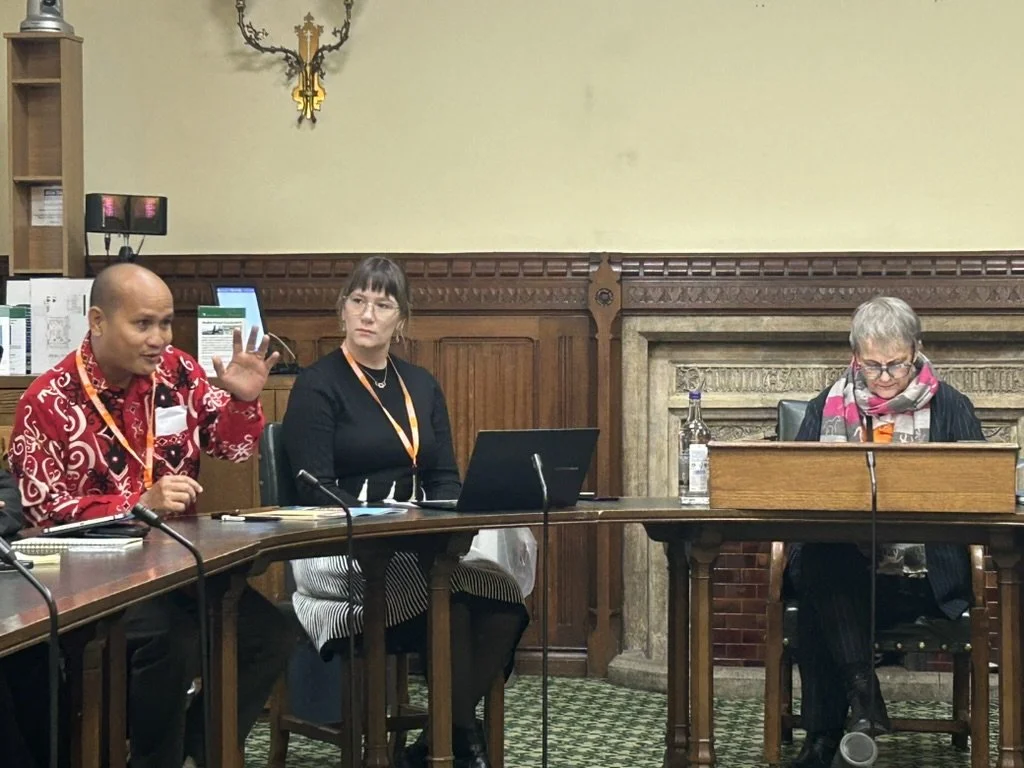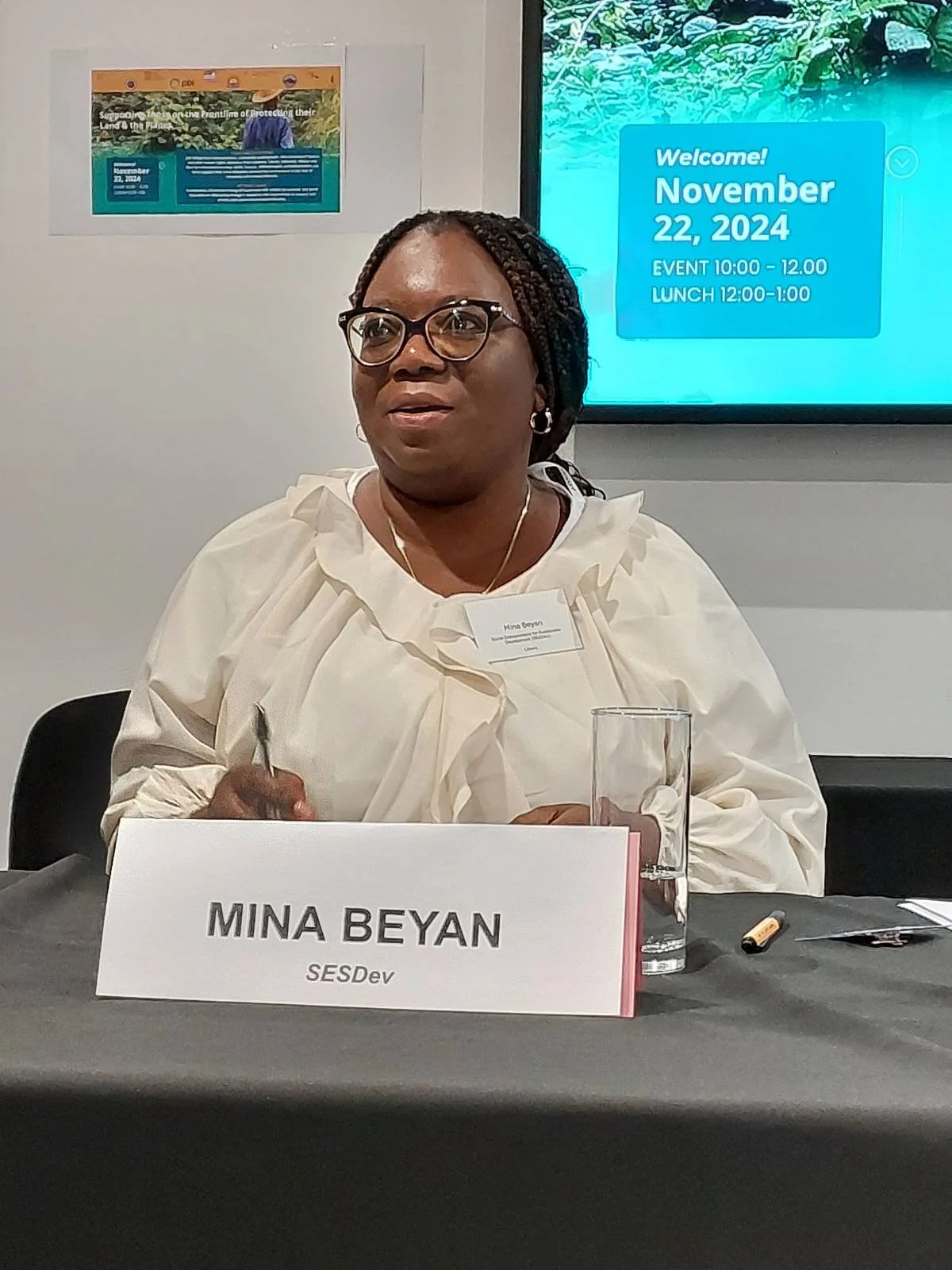Indigenous and Environmental Defenders Call on the UK to Protect Their Land and Livelihoods
In November, a cross-regional group of human rights defenders, Indigenous and Afro-descendent leaders and community representatives came to the UK to identify what stakeholders in the UK can do to support them in the protection of their land, environment and livelihoods. This work was undertaken by Peace Brigades International (PBI) UK in partnership with Forest Peoples Programme, welcoming twelve representatives from Indonesia, Colombia, Kenya, Liberia, Mexico and the Wampís Nation (in Peru). Many have been impacted by violations associated with a UK business or are working to hold UK corporations to account.
Indonesian human rights defender Tigor Hutapea explained the context of Indigenous communities in Indonesia confronting extractive industries.
Knowledge & Context Sharing
The week began with the group sharing their knowledge and learnings with one another. Each representative shared examples from their own countries of how communities and human rights defenders are successfully standing up to corporate human rights and environmental harms, and what they do to mitigate the threats they face in doing so. The industries cited ranged from gold mining to palm oil plantations. Though they differ greatly, one thing remained the same: communities and human rights defenders standing up to these harms face significant risks in doing so.
A common thread across all the presentations was that national laws do not adequately protect Indigenous peoples’ rights, land and livelihoods. For example in Papua, Indonesia, 41 million hectares of land has been unilaterally designated as a Forest (State) Area through Forestry Law No. 5 of 1967, allowing the government to issue permits and projects for developing extractive business economies on Papuan land and forests. Between 2001 and 2023, over 800,000 hectares of forest has been lost and degraded in Papua, with more than 2,000 hectares of deforestation between January and June 2024 alone in Sorong, Jayapura, Teluk Bintuni and Merauke Regencies. Just in Merauke District in South Papua, over 2 million hectares of ecosystems and living spaces belonging to Indigenous Peoples has been destroyed. The main industries linked to devastation are mining projects, oil palm plantations and infrastructure for forestry businesses.
Consultations & Capacity Building
The group went on to discuss what effective support from UK stakeholders for their communities would look like. In particular, they agreed on some key principles which will be required in any future UK law on mandatory due diligence so that it can have a meaningful impact globally.
PBI UK and Forest Peoples Programme are among multiple NGOs campaigning a for such a law, as a UK Business, Human Rights and Environment Act. The group agreed that any law would need to be underpinned by international human rights standards and the UN Guiding Principles on Business and Human Rights. Among the priorities for the group was for UK law to guarantee that businesses to fully respect collective and customary rights, including the rights to self-determination, and free, prior and informed consent.
Ahead of the group’s visit to Parliament to speak with Parliamentarians and civil servants later in the week, PBI UK’s Advocacy Manager, Christina Challis, facilitated a session on UK advocacy. The session involved a discussion on the UK’s current support to human rights defenders and affected communities, where gaps lie, as well as the different avenues of conducting advocacy in the UK.
Human rights defenders from Indonesia, the Wampís Nation (Peru) and Mexico in Parliament with PBI UK’s Director Ben Leather.
The Case for Change
Later in the week, the group went to Westminster to speak with parliamentarians from the House of Lords and the House of Commons, as well as civil servants from a range of relevant ministries. The group spoke about what they feel the UK should prioritise in a UK Business, Human Rights and Environment Act, summarising their discussions from the previous days. Baroness Ritchie of Downpatrick referenced her meeting the group in a Parliamentary debate that same day, leading to a commitment from the Minister for Latin America to meet with affected communities and human rights defenders.
The meetings provided an opportunity for the group to distribute copies of PBI UK’s launched new report launched that day, entitled “The Case for Change: Why human rights defenders need a UK law on mandatory due diligence”. The report highlights six case studies from Colombia, Honduras, Indonesia and Mexico that shows links between UK companies, environmental devastation and attacks on human rights defenders, calling for a new UK law to ensure effective due diligence.
Jesús Javier Thomas, a land rights defender from Mexico, was part of the group and is a representative of the El Bajío community, whose case is covered in the report. The community successfully called for the closure of a destructive open-pit gold mine operated by Minera Penmont on communal lands. Penmont is a subsidiary of Fresnillo PLC, a UK-incorporated company listed on the London Stock Exchange. Mexican courts ruled that Penmont was operating on the land illegally without the community’s permission, and ordered them to repair the environmental damage and compensate the community. Three of Jesús’ fellow land defenders who campaigned for implementation of the courts’ rulings have been murdered since 2018.
A written parliamentary question was tabled by Fabian Hamilton, a Labour MP and Chair of the All-Party Human Rights Group, referencing PBI UK’s report and the case of the El Bajío community, and requesting the Government bring forward legislative proposals to require companies operating internationally to carry out human rights and environmental due diligence..
The report and the delegation’s parliamentary advocacy received wide-reaching press coverage in the UK, Mexico, Indonesia, Peru and the United States, highlighting some of the human rights defenders’ cases.
You can find out more in the following selection of articles and a podcast:
Human rights activists face reprisals for opposing extractive industries, says report - The Guardian
Indigenous leaders travel to UK from Peru to draw attention to oil damage and banking - AP News
Threats faced by rights groups - Monocle Radio, interview with PBI UK Director, Ben Leather
Organizaciones buscan rendición de cuentas para el Ejido el Bajío, en Sonora - Proceso
Parlamento inglés analiza ley que permite castigar a mineras extranjeras que cotizan en Bolsa de Londres | Especial - Arestegui Noticias
Human Rights Defenders Demand UK Action on Corporate Accountability - Tempo
Londres: wampis denuncian daños del petróleo y banca - Servindi
How the International Community can Support Defenders & Communities
On the final day of the group’s visit to the UK, PBI UK held an event alongside Forest Peoples Programme, the Corporate Justice Coalition, the Business & Human Rights Resource Centre and other organisations to hear from the group first-hand about the risks they and their communities face, and what the international community can do to support them. The event opened with an address by the UN Special Rapporteur on the situation of human rights defenders, Mary Lawlor.
During the first panel, we heard from Colombian Indigenous rights defender Héctor Vinasco, who underscored the need to support local governance structures, community organisations and the right to self-governance, so that they can continue to protect their land, their culture, and the environment. Director and Senior Lawyer of Forest Peoples Programme, Tom Lomax, highlighted that the struggles that communities face are long-term, and therefore allyship must be too. He added that securing land rights and land tenure can be incredibly powerful in ensuring communities can protect other rights.
On the second panel, Eleanor Rosenbach, Director of the Corporate Justice Coalition of whch PBI UK is a member, explained the need for a UK Business, Human Rights and Environment Act. She emphasised that meaningful and effective legal mechanisms in the UK to litigate and prevent human rights and environmental harms linked to business practice don't yet exist - this is the gap that a mandatory due diligence law would fill. We also heard from Rowan Popplewell, Policy Manager at Bond, the UK network for organisations working in international development. Rowan echoed the call by a broad range of NGOs and defenders from around the world: that in order for the UK to adequately support human rights defenders, it needs to provide long-term, sustainable and flexible funding for civil society, as well as introduce a whole-of-government, strategic and cross-cutting approach to supporting them. PBI UK recently calld on the new UK government to step up in the fight to protect front line defenders.
Mina Beyan, a woman human rights defender working in Liberia, summarised the cross-regional group of defenders and community leaders’ priorities for what a UK Business, Human Rights and Environment Act should entail. Topping the list were a respect for all international human rights standards (including collective rights, self-determination and self-governance) and safeguards for affected communities & whistle-blowers. In 2025, Forest Peoples Programme and PBI UK will produce advocacy tools and organise campaign activities to ensure that the group’s demands are echoed in advocacy efforts towards a law and other UK responses.
What can you do to support human rights defenders, Indigenous and Afro-descendent leaders?
PBI provides life-saving support for human rights defenders. We have heard firsthand from our volunteers and the defenders we support about the impact that PBI has protecting the brave activists who:
→ Protect the environment and defend communities against the devastating impacts of climate change;
→ Call out corporations who aren’t safeguarding human rights and the environment;
→ Speak out against corruption.
RIGHT NOW one of our most important fundraisers, the Big Give Christmas Challenge is happening. It is a matched campaign meaning that for every £1 donated, PBI receives £2. There is so much work we are hoping to do that won’t be possible if we don’t get the financial support we need.
























